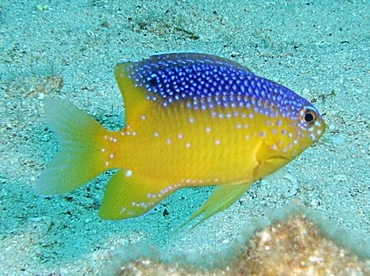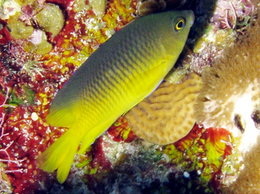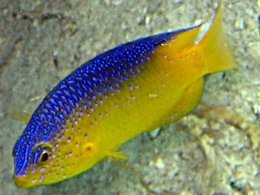Beaugregory (Biodiversity)
Contents
Beaugregory
The beaugregory (scientific name: Stegastes leucostictus) is a member of the damselfish family (Family Pomacentridae)that liveson coral reefs in the Western Atlantic Ocean and the Caribbean Sea (Caribbean Sea large marine ecosystem).
|
Scientific Classification Kingdom: Animalia (Animals) |
Physical Description
Adult beugregoriesare small (six to 10 centimeters in length) oval fish with dark coloration and a yellowish tail. Juveniles have bright yellow bodies, with a flash of blue along their backs
Distribution
This species is found in the Western Atlantic in Bermuda, from southern Florida (USA) to Brazil, in the northern Gulf of Mexico, and inthe Caribbean Sea.
Habitat
They live associated with coral reefs at depths range one to ten meters. They are common in seagrass beds, rubble areas, and sandy areas; however, this species is less common on healthy coral reefs.
Feeding Behavior
Unlike most damselfishes, beaugregories areominvores. Adults feed on algae (only about 20% of their diet), polychaetes, amphipods, foraminiferans and gastropods. Juveniles feed on small invertebrates such as copepods, nemerteans and polychaetes.
Behavior
They generally stay within half a meter of the substrate. Some males defend territories in areas of rubble whereas other males roam around the habitat.
Reproduction
Spawning occurs year round with peaks around the new moon. Males defend nest in small caves, shells, or other small protected sites and they clear off the hard surfaces in their nests. Males usually travel up to ten meters away to attract females to their nests by darting, dipping, and herding. Several females may lay eggs in a single nest that can contain up to 25,000 eggs. Males guard the nests from predatorsand occasionally fan the eggs. Eggs hatch in four to five days and the larvae enter the planktonic stage that lasts for about three weeks.
Associations
Male saddled blennies sometimes build their nest near those of beaugregories to take advantage of the vigorous nest defense by male beaugregories.
Conservation Status
This species is widespread and abundant throughout its range, such that it is considered to be a species at risk.
References and Further Reading
- Encyclopedia of Life. 2011. Stegastes leucostictus (Müller & Troschel, 1848)
- Fishbase. 2010. Stegastes leucostictus
- P.Humann and N.Deloach (Editor), 1994. Reef Fish Identification: Florida, Caribbean, Bahamas. New World Publications, Inc. Jacksonville, FL. ISBN: 1878348078
- N.Deloach. 1999. Reef Fish Behavior, Florida, Caribbean, Bahamas. New World Publications, Inc. Jacksonville, FL. ISBN: 1878348280


